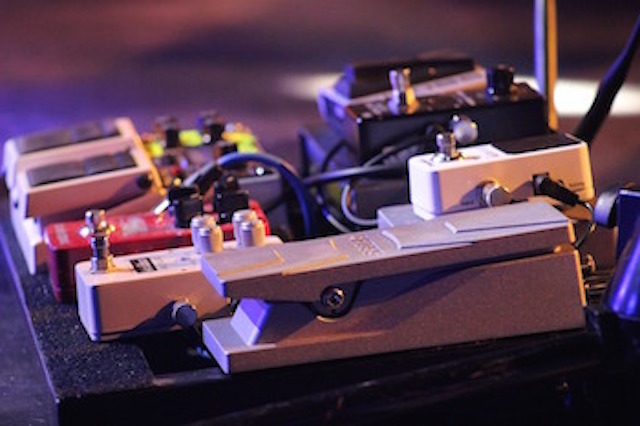Guitar Pedals

Some guitar pedals are more useful than others. So, you might ask, “What are the most important guitar pedals?”
Comparatively, some of the pedals that are used more frequently are the distortion, chorus, reverb, delay, and compressor pedals. The distortion is probably the most important pedal to have, followed by a good reverb pedal as the 2nd most important sound effect to have access to.
What Guitar Pedals are the Most Important?
The distortion pedal ranks #1 in importance. It can give you a chunky rhythm sound, a blues guitar grit, or it can be dialed up to give you a smooth fuzz tone found in heavy metal music. You can also use it to give yourself a volume boost as you are going into a killer solo.
Many players will overdrive their amplifier as a way to get the distortion effect. However you get to it, the distortion effect is essential for the electric guitar player.

Once you have your distortion pedal, it’s time to start looking at the other pedals. Start learning how each pedal can enhance your sound.
- Distortion Pedal
- Reverb Pedal
- Delay Pedal
- Chorus Pedal
- Compressor Pedal
Reverb Pedal
The reverb pedal can be described as taking the edge off. Likewise, it is sometimes referred to in terms of being “wet”. Consequently, a guitar without reverb is referred to as being “dry”.
Two common ways that it is often used is either by dialing it way up so that you get an “in your face reverb”, or dial it way back so that it is barely perceptible. In other words, very subtle and just taking off a bit of the edge.
Delay Pedal
The delay pedal is versatile and able to create all kinds of cool usage variations. I personally like the ambiance effect where there are 2-3 short delays that sequentially diminish in volume. It makes it sound as if you are playing in a large hall and the sound is bouncing off wall to wall. Many players will set the delay in time with the music and then play a short repetitive riff. This will give the riff a wash, or filler type sound. Very popular with Praise bands.
A third delay pedal usage would be as a musical accent. Pick the last note of a musical passage and let the note echo off into the distance.
Chorus Pedal
The chorus pedal has speed and depth settings. The pedal essentially takes the input signal and splits it in to two signals. One signal remains the same and the pitch stays just like you sent it in. The other signal is slightly detuned, which is controlled by the depth setting. The wider the depth setting, the further the pitch of that signal is effected. The pitch of the detuned signal is then combined with the original signal. The wave of the detuned signal alternately will go above and below the original stabilized pitch. How quickly it does this is determined by the speed setting. The end result is a thicker sound (chorusing) which can make your chords sound fuller.
Compressor
Have you ever heard a guitar player pick a note, and that note never decays? It just hangs there and lasts as long as the guitar player holds the note. That is compression.
It has settings on it that can squeeze a note into as narrow a volume band as they choose. It can take a loud volume and drop it down into a set band width. Likewise, it can take a note played at a soft volume and bring that note up. The end result is that you can create infinite sustain by never allowing a note to decay.
Other Effects Pedals
Equalizer, Flanger, Octavider, Harmonizer, Enhancer, Wah Wah, and boost pedal are a few. However, there are gear heads out there constantly on the prowl for new, different, and better.
